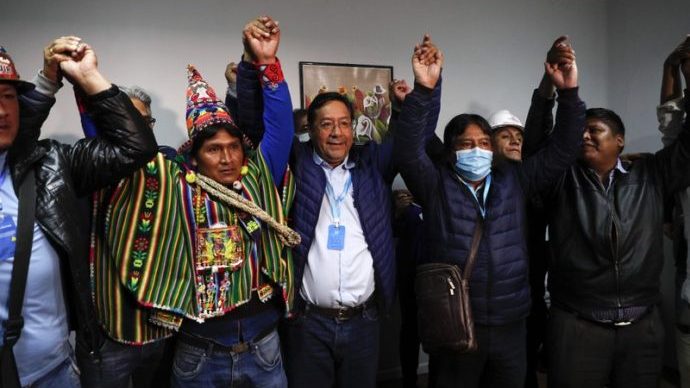Between the Vatican’s McCarrick report and the US presidential elections, much of what’s happened in the rest of the global Church over the past week has gone unnoticed.
Here’s a round-up, including the Argentine bishops accusing the president of being a pawn of the “abortion lobby;” Bolivians asking their newly elected president to respect the constitution; prelates in Peru applauding protests in the midst of a pandemic; and survivors of clerical abuse once again facing disappointment in Chile.
Chile
This past week, the Vatican’s Congregation for the Doctrine of the Faith found Father Jorge Laplagne, a renowned priest in Santiago, Chile’s capital, guilty of sexually abusing a minor 15 years ago.
Javier Molina, a former altar boy for Laplagne, had accused the priest of sexual abuse and abuse of power. He did so first in 2010, but Cardinal Francisco Javier Errazuriz, then Archbishop of Santiago, after hearing the allegations from Molina himself, accepted a report by the then-Promotor of Justice of the archdiocese concluding the accusations were “not true,” and decided not to investigate.
It wasn’t until 2018, when Pope Francis dispatched a Vatican investigative team to look into the Chilean abuse crisis that things changed. With the help of an NGO called “Para la Confianza,” founded by three clerical abuse survivors, Molina accused Laplagne again, and this time around, added charges of cover-up against Errazurizz, his successor Cardinal Ricardo Ezzati, and the Promoter of Justice.
The Vatican’s ruling was made public last Tuesday, and Laplagne has said he’s planning to appeal. Until then, he remains suspended from ministry.
Also in Chile, last week the Jesuits rejected a lawsuit by victims of Father Jaime Guzmán Astaburuaga, already found guilty of abuse. The order claims the crimes named in the suit have “prescribed,” meaning the statute of limitations has run out, and that they occurred in a “social context very different from the current one.”
Four former students of a Jesuit-ran school have demanded $150,000 each for moral damages, because they believe the religious order not only failed to prevent abuse but also failed to properly select priests and teachers in their schools.
Father Gabriel Roblero Cum, local Jesuit superior, said they’re willing to offer one of the four victims $20,000, and to continue a “process of symbolic reparation.” He claims the crimes have prescribed but didn’t deny they happened, acknowledging the priest “committed various acts of a sexual connotation.”
Guzmán was found guilty by the Vatican and sentenced to removal from the clerical state. However, he too appealed and is awaiting a final resolution.
In their response to the lawsuit, the Jesuits argued that the events took place over 30 years ago, and that what happened, while it seems reprehensible today, was ignored at the time. For example, the Jesuits pointed to the fact that the entire school community knew the priest organized retreats for students and that pictures from those retreats, “far from being hidden,” were posted on the school’s bulletin board.
“Situations such as those reported were normalized to the point that the students agreed to attend these activities, even knowing that in said retreats the students bathed naked, were photographed by the priest Jaime Guzmán Astaburuaga, and that surely at least one of those photos would be published in a bulletin board from the school, [and yet] they agreed to attend this activity, ” the Jesuit defense brief argues.
In effect, the suggestion is that the Jesuits can’t be blamed for not stopping something no one at the time perceived as wrong.
Bolivia
Last week, newly elected Bolivian President Luis Arce, who ran as the candidate of former President Evo Morales, was sworn in. Addressing parliamentarians, citizens and international guests, he promised, “We are beginning a new phase in our history without discrimination. We will try to rebuild our country in order to live in peace.”
The local bishops conference congratulated him, saying they hope this new chapter in the country’s history might have a positive impact.
“Bolivia is a country with great potential for great development, but it is necessary to work together responsibly to achieve it,” wrote the bishops.
They told Arce and the newly installed government they had one “fundamental request: respect for the constitution.”
“We know that Bolivia is experiencing various crises” and the only way to face them is by working together, the bishops wrote.
After almost a year in exile, Morales went back to Bolivia last Monday. Despite the warnings of some, Arce insisted the former president will not take back the job – which has happened in previous occasions in Latin America, including in Argentina, back in the 1970s, when General Juan Domingo Peron wasn’t allowed to run for president in exile, but after his candidate won the elections, came back and a new vote was called so he could take over. That final presidency of Peron led to a military government and Argentina’s “Dirty War.”
In an interview during the campaign, Arce said the “biggest mistake” made last year was to have Morales as a candidate, which would have been his fourth consecutive term, despite a referendum in 2019 where the people voted against a constitutional amendment to make that possible.
Peru
Peru has been in crisis since congress forced popular President Martin Vizcarra out of office, claiming corruption and mismanagement of the COVID-19 pandemic.
Vizcarra’s supporters took to the streets, and interim president Manuel Merino ordered a crackdown that ended with at least three dead and 13 injured on Saturday. That prompted Peru’s Congress to call for the “immediate resignation” of Merino, which he promptly did on Sunday after just five days in office.
Since Vizcarra was ousted, several Peruvian bishops supported the protests against the ousting of Vizcarra and the new administration, despite the coronavirus crisis. Peru has recorded over 900,000 COVID-19 cases and more than 35,000 deaths.
Among those bishops is Cardinal Pedro Barreto, Archbishop of Huancayo, who told a local radio station they are “defending the dignity of the Peruvian people.”
Speaking of the ousting of the former president, Barreto said that “although some may say it has been legal, it is not considered legitimate, because society also has a word to say.”
Archbishop Carlos Castillo of Lima described the protests as “forceful, and great, and strong.” He added that together with Barreto, they’re willing to help achieve “an understanding” between protesters and authorities.
Argentina
Back in March, Argentine President Alberto Fernandez urged his countrymen to stay home to prevent the spread of COVID-19 because a “life lost is a life that won’t rise up again,” while, he argued, the economy could always recover.
After almost 230 days of lockdown, Argentina is among the top 10 countries in terms of deaths per capita and positive cases, and statistics show that 50 percent of the country’s population will be below the poverty line at years end. Hospitals have been working at top capacity for months, with many states banning non-essential surgeries.
In this context, Fernandez has his mind set on fulfilling his campaign promise of making abortion “legal, free and safe,” a measure the Argentine Congress rejected in 2018 after millions went out to the streets saying they don’t want the practice. At the time, Amnesty International paid close to a million dollars to buy a back page ad in The New York Times to issue a “warning” to Argentina’s elected officials: “We’re watching you.”
Abortion currently is allowed in Argentina in most states, following a protocol that makes it available to women when their lives are at risk, if the baby is not expected to survive birth or if the pregnancy is result of rape.
Among the many prelates who spoke against wider legalization is Bishop Alberto Bochatey, auxiliary of La Plata and president of the Argentine bishops’ commission for health ministry.
“It’s clear that the president has a strong commitment to some groups and the pro-abortion lobby,” he told a radio station Nov. 12.
Fernandez claims he’s trying to fulfill a campaign promise, but Bochatey argued that there are other promises he made that are a lot more urgent, including raising the pensions of the country’s elderly, who, he said, are “being killed” by new government measures that cut pension funds.
The bishop said he believes the government is using abortion as a political smoke screen to distract citizens from an economic downfall, the COVID-19 crisis and attempts to reform the justice system to guarantee that corruption charges are dropped against Fernandez’s Vice President, Cristina Kirchner.
Bochatey claimed that the “city of Buenos Aires registered more than eight thousand abortions last year, and this year they have more than four thousand.” If the practice were be legalized, he said, “it would be the first time that Argentine legislators pass a law that implies killing a human being.”
He also questioned the statistics given by pro-abortion groups claiming there are between 370 and 500 thousand yearly abortions in Argentina, a nation with 43 million citizens. These numbers would mean there are more than a thousand abortions per day and almost 50 per hour, far superior to the number of births.
Pro-abortion groups also claim that thousands of women die every year due to badly performed illegal abortions.
“If so many women die” due to this practice, Bochatey asked, “where are the bodies? They had to be buried, a doctor had to sign the death certificate and then the family members took them to a cemetery.”
Argentina’s death registry claims just 40 women died due to complications from pregnancy loss, both natural and induced, in 2018. Pro-life groups have long argued that, even though every life matters, abortion ranks 40 on the list of 50 causes of death for women of childbearing age.
“There are 39 more serious causes of death,” Bochatey said. “Don’t be fooled, abortion is an ideological issue, it’s a matter of pacts and obligations that [the government has] with international organizations to establish the ‘new right’ to eliminate the life of the unborn human being.”
“This is what Francis calls ideological colonization,” he concluded.

